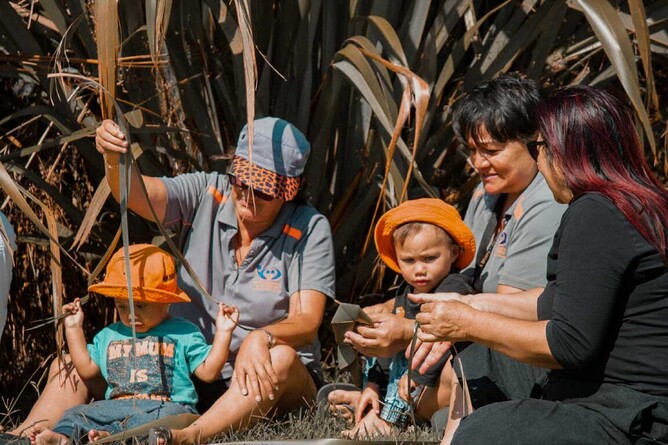Hana Tuwhare, Community Activator, with support from Anthony-Quinn Cowley, Community Activator-Ōpōtiki, and Huhana Moselen.
“Huingapani has taught us a thing or two on the language we use around her… At the age of 1 her dictionary already amazes us.” – Awhina
Ko te mātauranga te waka e kawe nei ngā wawata Education is the vehicle to realizing our potential dreams and aspirations
The Whakatōhea Māori Trust Board (WMTB) are leading the way as an iwi focusing on early oral language development. They have high aspirations for the future of their tamariki (children) and see oral language as a foundation for wellbeing, educational achievement and life success as Whakatōhea. They’re doing it from the grassroots, and they do it for the aroha of whānau.
Talking Matters, a kaupapa to get everyone talking with pēpi in the first 1000 days, and the WMTB connected over shared values and purpose. A vision aligned to create an Ōpōtiki wide focus on early oral language that also supports the implementation of Whakatōhea’s Maurua Education strategy, which at the heart is all about the revitalisation of Whakatōhea reo (language) and tikanga (culture). WMTB carries Whakatōhea specific indigenous ways of parenting, learning, and mātauranga (knowledge), while Talking Matters weaves in its cutting-edge LENA technology, experience, and technical skills to form a partnership based on iwi leadership.
Authentic whanaungatanga takes time but takes us far
Whanaungatanga is about connecting through shared experiences and working together to create a sense of belonging. Over an 18 month period, Talking Matters and Whakatōhea met mata-ki-te-mata (face to face) and had many conversations, which allowed time for trust and understanding to grow. Whanaungatanga is the work that has allowed the partnership to be authentic, flexible, and sustainable. It has also laid the foundation for the implementation to flow and for Talking Matters to be in tune and responsive to the aspirations of Whakatōhea.
Rota Carrington, then Education Group Manager for WMTB in 2019 shared: “It has not been two years since I ‘discovered’ Talking Matters and wondered how this Auckland outfit could help our Iwi. We have come such a long way and in such a short time accomplished so much even as we are still building the framework around how we will deliver. This has all been done with Talking Matters approach to empowering us to do this in a way that is ours... It has all been offered with support and guidance for Whakatōhea to have control over how we do it. An amazing journey with a long way still to go.”
Whakatōheatanga | Identity as Whakatōhea
Through the whanaungatanga process, it was clear that any kaupapa coming into Whakatōhea needed to be flexible enough to encompass the local mita (dialect) and tikanga as well as being flexible enough for whānau to use the kaupapa in their own way. It also needed to be responsive and relevant to where whānau were at in their own reo Māori and tikanga journey.
Talking Matters engaged with Rota in an exploration of ancient forms of Māori literacy contained within iconography, i.e., pou whakairo (carved posts), moko (Māori tattoo) and te taiao (the environment). ‘Reading’ Māori iconography was an essential skill for tūpuna (ancestors) to ensure the intergenerational transmission of knowledge to pēpi (baby). It is a skill and art form that declined along with the speaking of te reo Māori. However, as with te reo Māori revitalisation, it is possible to revive ancient forms of Māori literacy with a focus on early oral language.
The WMTB boardroom holds many pou whakairo that carry the pūrākau (origin stories), histories and language of Whakatōhea tūpuna. Rota suggested that the boardroom, which was usually reserved for meetings with adults, could be opened to whānau and pēpi. It was an opportunity for Whakatōhea whānau to experience a language rich environment that grounded them in their Whakatōhea identity.
Danny Paruru, Iwi Development Projects Manager, is an expert on Whakatōhea whakapapa and tikanga. He shared with whānau and pēpi, the pūrākau of the nine pou whakairo in the boardroom which represent tūpuna associated with the nine hapū (sub-tribes) of Whakatōhea. A beautiful example of a rich oral language experience that whānau can continue to share with pēpi, strengthening their Whakatōhea identity.
Reaching pēpi across Ōpōtiki
A focus on early oral language within the first 1000 days across Ōpōtiki has started within the WMTB early education center and social services. This focus allows whānau, teachers and social workers who connect with pēpi to take a deep dive into data that informs their parenting and practice. Working alongside Talking Matters speech-language therapists as technical coaches, whānau and practitioners develop their capacity and capability to create language rich environments for pēpi.
Awhina Kurei-Ranapia, mother of one-year old Huingapani, shares, “Huingapani has taught us a thing or two on the language we use around her. Every day we try our hardest to implement rich reo in our whare both English and te reo Māori. Everyday her and her sisters are growing in an environment that supports their personal growth. Every day at home or at homecare she is a part of a village that cares about her taiāo and mātauranga. At the age of 1 her dictionary already amazes us.”
While this kaupapa is still in its infancy, we celebrate the leadership of Whakatōhea iwi in the oral language space and look forward to watching their tamariki and pēpi flourish as bi-lingual thinkers, talkers and readers.
This article originally appeared in the magazine of the NZ Speech Therapy Association, Communication Matters Issue 41, Summer 2021. Reused with permission.


